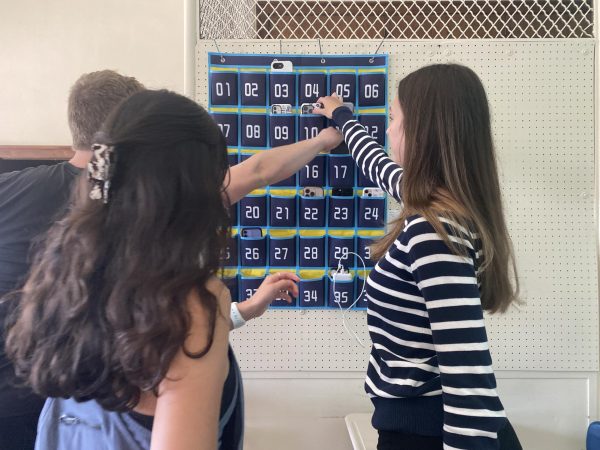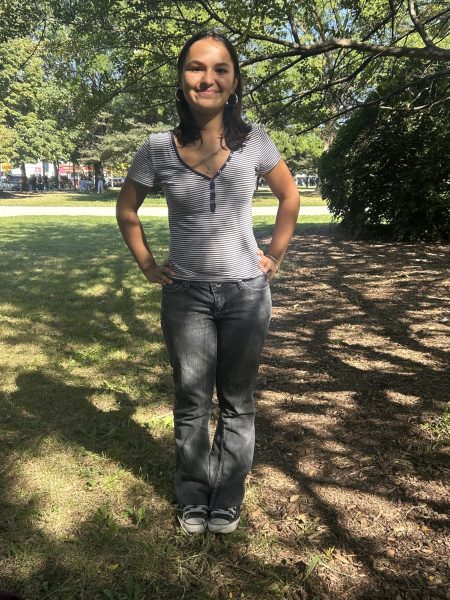Immigration activist Tanya Cabrera visits Dreamers Club
A presentation held at Lane on November 18th was given to encourage undocumented students a chance at something not easily acquired: higher education. Teachers, members of the Dreamers Club, as well as other undocumented students gathered for the presentation to gain a little more knowledge and shed some light on the issue. It was led by immigration activist Tanya Cabrera.
A former college and career coach at Benito Juarez High School on the south side of Chicago, Cabrera is the Illinois DREAM Fund Commission Chair and the Associate Director of student outreach and diversity initiatives at IIT.
Some of her top students at Benito Juarez found themselves in this situation of being undocumented. Cabrera made it her duty to ensure that she assist her students and all students within this category. She collaborated with colleges across Chicago, then state-wide.
“I was commissioned by the Governor to lead the fund within the non for profit sector,” Cabrera explained. “My father was an immigrant organizer and activist, so I guess you can say its in my DNA.”
The Illinois DREAM Fund Commission became active in August 2011. The commission became non-for-profit in March 2012. All funds that go towards these scholarships are private, meaning no state dollars are used. There are all kinds of donors, big and small, as well as corporate allies that contribute to the fund. The first year, the commission sent 50 undocumented students to college. The second year, 36.
Cabrera dropped the cold facts on the group: There are 511,000 undocumented immigrants in Illinois and 13,000 undocumented students in Illinois will graduate in 2015.
An estimated 7% of that group will financially be able to attend community college.
To many undocumented students with high hopes for college, this can be a disappointing piece of information to hear. However, according to Cabrera, in today’s society with outrageous college tuition expenses, the best option for an undocumented student is to start with community college and transfer to a university later. Community colleges are more affordable, they offer scholarships, and they give you a flexible schedule, all of which is ideal for an undocumented student.
“Of the estimated 100,000 undocumented students enrolled in two and four year institutions in Illinois, 78% are juggling work, family, and school,” Cabrera stated. “On top of that, nearly two-thirds have income below 200% federal poverty level.”
Undocumented students are not eligible for federal aid, which is due to policy and legislation. DACA is Deferred Action for Childhood Arrivals. It’s an American government policy, passed in June 2012, that allows eligible undocumented immigrants a two-year renewable work permit and exemption of deportation. To be eligible, you had to have entered the country either before your 16th birthday or have been under the age of 31 before June 15, 2012.
Over 500 undocumented students in Illinois completed a FAFSA with their DACA social security number (social security number given to undocumented immigrants that meet certain guidelines) in the 2013-2014 year. Doing so is wrongfully accepting government funds as an undocumented immigrant, which is a federal violation.
Cabrera wants a change in attitude towards undocumented students. She believes they all have a right to education just like everyone else. Cabrera states that immigration reform with a path to permanent legal status would boost the U.S. economy by $1.5 trillion over the next 10 years.
The application for undocumented students is live as of Dec. 3. All applicants will be connected to FREE DACA Clinics, sponsored by National Immigrant Justice Center.
If you or anyone you know is eligible for this application, Cabrera highly recommends that you complete it. Everyone has a right to higher education, no matter the difficulty of the circumstance.
Your donations directly fund the Lane Tech student journalism program—covering essential costs like website hosting and technology not supported by our school or district. Your generosity empowers our student reporters to investigate, write, and publish impactful stories that matter to our school community.
This website is more than a publishing platform—it's an archive, a research tool, and a source of truth. Every dollar helps us preserve and grow this resource so future students can learn from and build on the work being done today.
Thank you for supporting the next generation of journalists at Lane Tech College Prep!




